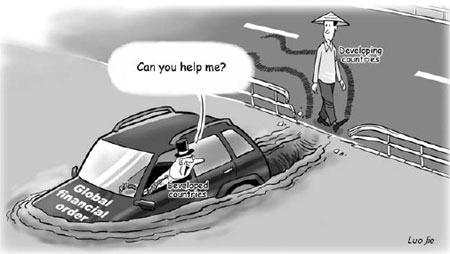By Huang Qing
The Group of 20 (G20) will hold a summit meeting in Washington tomorrow to discuss the financial market and global economy.
Heads of state from the Group of Seven (G7) nations and some other member countries of the European Union (EU) as well as from nations such as Russia, China, Brazil and India will attend the meeting to find ways to maintain financial market stability and fuel global economic development.

The participants represented at the summit are important economies in the world with a combined economic aggregate accounting for 85 percent of the world's total.
The latest financial summit was jointly called by French President Nicolas Sarkozy, British Prime Minister Gordon Brown and US President George W. Bush.
Its background mainly consists of two factors: The global economy is staring at an approaching worldwide recession as the financial tsunami triggered by the US subprime crisis has impacted all major economic entities of the world. And the international monetary system based on the US dollar is now struggling to stay above the water in a credibility crisis.
The crisis that the international financial market and the international monetary system are in reflects two major problems.
One is that in the past 20 years of development the virtual economy in the US and other developed countries has far outpaced the development of their real economies and they now have to suffer a crisis in order to get rid of the "swelling" and get back to "normal".
The other is that in the past 20 years of development an international division of labor has taken shape: the East Asian countries have become the main suppliers of commodities and Middle East nations and Russia have become leading suppliers of energy resources, while the US has become the main supplier of financial products such as currency.
The US has been taking advantage of the US dollar as the basic currency but not acting responsibly as it should have. It has been enjoying a good life by maintaining fiscal balance with borrowed money and, by doing so, it has created a structural paradox and imbalance in the international financial equilibrium. Such an international system of revenue and expenditure is unsustainable by nature and will throw the international monetary system into a crisis when something goes wrong.
A financial crisis is the symptom of financial imbalance, which requires appropriate adjustment and "resetting" whether one likes it or not. Amid the ongoing globalization a crisis will affect all nations on earth and can be addressed only by coordinated efforts of them all.